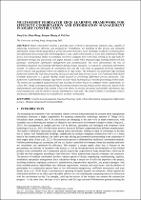Chapter Multi-Robot Federated Edge Learning Framework for Efficient Coordination and Information Management in Smart Construction
| dc.contributor.author | Liu, Xinqi | |
| dc.contributor.author | Wang, Jihua | |
| dc.contributor.author | Huang, Ruopan | |
| dc.contributor.author | Pan, Wei | |
| dc.date.accessioned | 2024-04-02T15:45:50Z | |
| dc.date.available | 2024-04-02T15:45:50Z | |
| dc.date.issued | 2023 | |
| dc.identifier | ONIX_20240402_9791221502893_47 | |
| dc.identifier.issn | 2704-5846 | |
| dc.identifier.uri | https://library.oapen.org/handle/20.500.12657/89078 | |
| dc.description.abstract | Smart construction involves a growing array of devices that generate extensive data, capable of enhancing construction efficiency and productivity. Nonetheless, the handling of this diverse and abundant information, along with the geographical spread of construction sites, poses challenges to effective communication and information processing within the management system. Multi-robot systems, as a new type of Internet of Things device, have the potential ability to coordinate workers to complete their work while serving as an edge node for information storage and processing. This paper presents a multi-robot federated edge learning framework that facilitates construction information management and communication. The work demonstrates the role of distributed databases in processing information during project execution, in contrast to centralized information systems. To address the intricacies of construction sites and the wide array of equipment involved, unmanned aerial vehicles and quadruped robots are employed as edge nodes. The formation of a federated edge learning framework ensures the real-time processing of massive data and data privacy issues. The Federated Multi-Robot (FedMR) framework is a global sharing model focused on preserving differential privacy protection. This framework is distributed to multiple edge robots in each round, enabling local real-time processing of robot tasks. The system can accomplish target detection and tracking of workers based on computer vision. Additionally, we collect MiC energy consumption data during the construction process and predict carbon emissions. Based on the implementation and testing of the system, it has been shown to provide structured and reliable information, fast local transmission, and the ability to process information in real-time. The system's ability to coordinate workers and process information makes it a valuable tool in smart construction | |
| dc.language | English | |
| dc.relation.ispartofseries | Proceedings e report | |
| dc.subject.classification | thema EDItEUR::U Computing and Information Technology::UT Computer networking and communications::UTV Virtualization | |
| dc.subject.other | Construction management | |
| dc.subject.other | federated learning | |
| dc.subject.other | multi-robots | |
| dc.subject.other | Information management | |
| dc.subject.other | differential privacy | |
| dc.subject.other | Modular Integrated Construction(MiC) | |
| dc.title | Chapter Multi-Robot Federated Edge Learning Framework for Efficient Coordination and Information Management in Smart Construction | |
| dc.type | chapter | |
| oapen.identifier.doi | 10.36253/979-12-215-0289-3.54 | |
| oapen.relation.isPublishedBy | bf65d21a-78e5-4ba2-983a-dbfa90962870 | |
| oapen.relation.isbn | 9791221502893 | |
| oapen.series.number | 137 | |
| oapen.pages | 11 | |
| oapen.place.publication | Florence |

